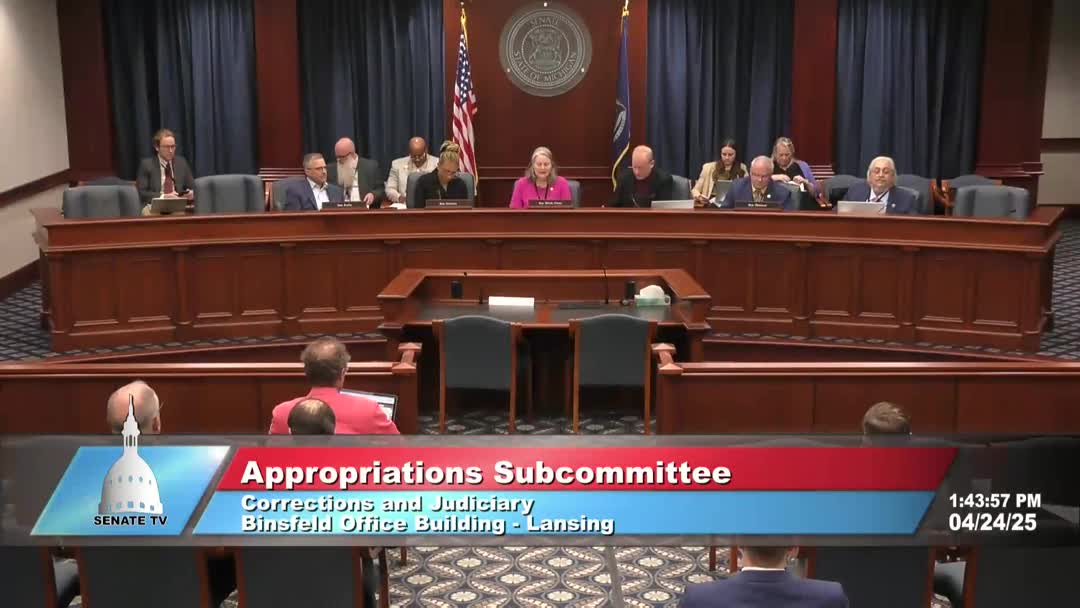Subcommittee adopts SB170 S1, backs $21.9 million net increase for judiciary including case-management and one-time grants
Get AI-powered insights, summaries, and transcripts
Subscribe
Summary
The Appropriations Subcommittee on Corrections and Judiciary adopted Senate Bill 170 S1 and reported it to the Senate Committee on Appropriations. The subcommittee's judiciary recommendation includes a roughly $21.9 million gross increase and a $21.5 million increase in GS spending for fiscal 2025-26.
The Appropriations Subcommittee on Corrections and Judiciary adopted Senate Bill 170 S1 and reported it to the Senate Committee on Appropriations. The subcommittee's judiciary recommendation includes a roughly $21,900,000 gross spending increase and a $21,500,000 increase in general-spending (GS) from the current year, as presented to the panel.
Senate fiscal analyst Michael Syracuse told members the subcommittee largely accepted baseline adjustments from the governor's executive recommendation and recommended several program-level changes, including funding for a statewide case-management system and modest reductions to other recommended items.
Why it matters: SB170 funds court administration and statewide systems used by the judiciary. The package includes recurring and one-time spending that could affect court operations, problem-solving courts and resources for post-conviction/resentencing proceedings.
Key elements and discussion
- Spending and baseline: Syracuse told the subcommittee the judiciary recommendation shows a $21,900,000 gross increase and a $21,500,000 increase in GS spending, representing a year-over-year increase the analyst described in percentage terms during his presentation.
- Statewide case-management system: The subcommittee recommended the full requested amount for a statewide case-management system at $7,200,000.
- Reductions: The subcommittee reduced one recommended increase for the state court administrative office's HR and finance support from $3,800,000 to $2,700,000. It also reduced the governor's recommended expansion for problem-solving courts from $1,584,000 to $1,500,000 (a reduction of $84,000), as Syracuse described.
- One-time items and placeholders: The subcommittee included three one-time items: an innocence grant to the University of Michigan Law School Innocence Clinic (just under $500,000, described as a one-time work project), a work project to address a backlog at the judicial tenure commission, and a placeholder for additional costs associated with resentencing hearings after recent Supreme Court decisions (the transcript describes a placeholder anticipating additional costs but does not provide a final figure).
- Boilerplate changes and contingency authority: Syracuse said the recommendation includes contingency fund spending authority for judiciary federal, restricted and private funds and that the boilerplate will consolidate references to "problem-solving courts" to include drug treatment, mental health and veterans courts.
Votes and formal actions
- Motion to adopt Senate Bill 170 S1 and report to the Senate Committee on Appropriations: moved by Senator Irwin and supported by Senator Santana. The recorded roll call in the transcript shows Senator Schenck (Yes), Senator Santana (Yes), Senator Irwin (Yes) and Senator Outman (No). The transcript records the S1 substitute as adopted and SB170 S1 as reported to the full Appropriations Committee.
Discussion vs. decision
- Discussion: Fiscal staff described line-item changes, the statewide case-management system funding and one-time grants; members asked no substantive follow-up questions recorded in the transcript.
- Decision/direction: The subcommittee adopted the S1 substitute for SB170 and voted to report SB170 S1 to the Senate Committee on Appropriations.
What remains unclear from the transcript
- The transcript records summary roll-call tallies and some member names; where the transcript contains ambiguous spellings of member names the article avoids inferring absent facts. The specific dollar amount for the placeholder tied to resentencing hearings was not provided in the subcommittee presentation.
Next steps and context
SB170 S1 now proceeds to the full Senate Appropriations Committee. The subcommittee consolidated certain court-related lines and created a boilerplate definition for problem-solving courts that combines veterans, mental-health and drug-treatment court lines into a single grouping for future appropriation language.
